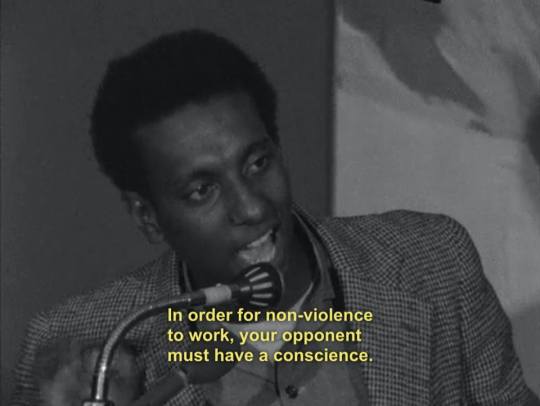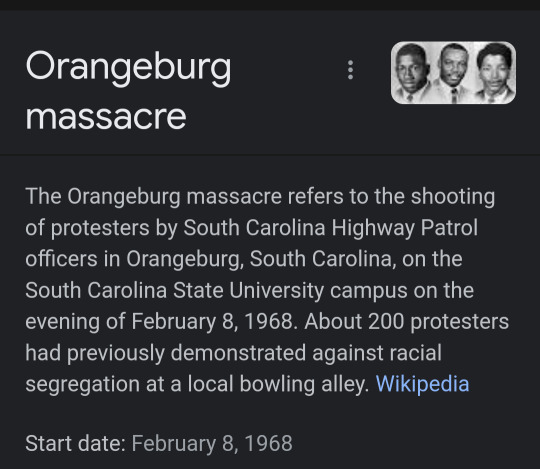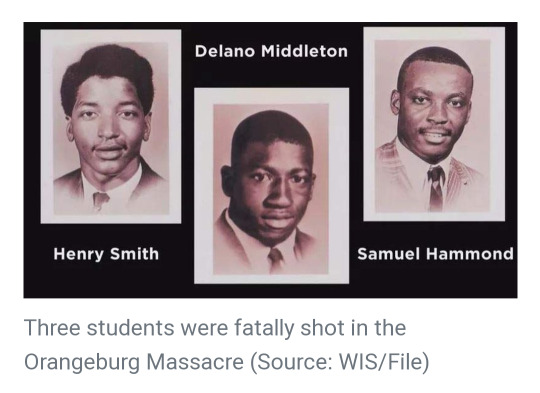#black students matter
Text


[ID: Two black and white photos of Kwame Ture/Stokely Carmichael, a young Black man, saying into a microphone with a sardonic expression, "In order for non-violence to work, your opponent must have a conscience. The United States has none, has none." End ID.]
#Kwame Ture#Stokely Carmichael#Pacifism#anti colonialism#antifashism#antifascism#antifashist#antifascist#got tired of seeing the inaccessible version knowing there's doznes of IDs buried in the comments#described images#accessible photos#Black Panthers#Black Power#Student Nonviolent Coordinating Committee#SNCC#non-violence#peace#united states#politics#ferguson#From the river to the sea Palestine will be free#free Palestine#free gaza#Gaza#Palestine#BLM#Black Lives Matter#Landback
901 notes
·
View notes
Text

https://www.miamiherald.com/news/local/education/article278582149.html
Tallahassee
When Florida rejected a new Advanced Placement course on African American Studies, state officials said they objected to the study of several concepts — like reparations, the Black Lives Matter movement and “queer theory.”
But the state did not say that in many instances, its reviewers also made objections in the state’s attempt to sanitize aspects of slavery and the plight of African Americans throughout history, according to a Miami Herald/Tampa Bay Times review of internal state comments.
For example, a lesson in the Advanced Placement course focused on how Europeans benefited from trading enslaved people and the materials enslaved laborers produced. The state objected to the content, saying the instructional approach “may lead to a viewpoint of an ‘oppressor vs. oppressed’ based solely on race or ethnicity.”
In another lesson about the beginnings of slavery, the course delved into how tens of thousands of enslaved Africans had been “removed from the continent to work on Portuguese-colonized Atlantic islands and in Europe” and how those “plantations became a model for slave-based economy in the Americans.”
READ MORE: DeSantis says AP African-American studies class was ‘pushing an agenda’
In response, the state raised concerns that the unit “may not address the internal slave trade/system within Africa” and that it “may only present one side of this issue and may not offer any opposing viewpoints or other perspectives on the subject.”
“There is no other perspective on slavery other than it was brutal,” said Mary Pattillo, a sociology professor and the department chair of Black Studies at Northwestern University. Pattillo is one of several scholars the Herald/Times interviewed during its review of the state’s comments about the AP African American Studies curriculum.
“It was exploitative, it dehumanized Black people, it expropriated their labor and wealth for generations to come. There is no other side to that in African American studies. If there’s another side, it may be in some other field. I don’t know what field that is because I would argue there is no other side to that in higher education,” Pattillo said.
Alexander Weheliye, African American studies professor at Brown University, said the evaluators’ comments on the units about slavery were a “complete distortion” and “whitewashing” of what happened historically.
“It’s really trying to go back to an earlier historical moment, where slavery was mainly depicted by white historians through a white perspective. So to say that the enslaved and the sister African nations and kingdoms and white colonizers and enslavers were the same really misrecognizes the fundamentals of the situation,” Weheliye said.
DeSantis’ efforts to transform education in Florida
The commentary is also an example of how Gov. Ron DeSantis has transformed the state’s education system in his quest to end what he calls “wokeism” and “liberal indoctrination” in schools — a fight that began in the aftermath of the pandemic and the Black Lives Matter movement that followed the high-profile murder of George Floyd at the hands of police in Minnesota.
“It’s not really about the course right? It’s kind of about putting down Black struggles for equality and freedom that have been going on for centuries at this point in time and making them into something that they are not through this kind of distorted rightist lens,” Weheliye said.
When asked about the findings of the previously unreported internal reviews, the Florida Department of Education said the course was rejected after state officials “found that several parts of the course were unsuitable for Florida students.”
Cailey Myers, a spokesperson for the agency, cited the work of many Black writers and scholars associated with the academic concepts of critical race theory, queerness and intersectionality — a term that she said “ranks people based on their race, wealth, gender and sexual orientation.” The term, however, refers to the way different social categorizations can interact with discrimination.
Brandi Waters, the executive director of the AP African American Studies course, said it is hard to understand the Florida Department of Education’s critiques on the content because state officials have not directly shared their internal reviews with the College Board. The state and the College Board, however, were in communication about the course for several months before it was rejected.
Waters maintains the coursework submitted to the state was the most holistic introduction to African American Studies.
A deeper look at Florida’s objections
The course materials provided by the College Board were reviewed by Florida Department of Education’s Bureau of Standards and Instructional Support and the decision to reject the course was made by “FDOE senior leadership,” records show.
John Duebel, the director of the state agency’s social studies department, and Kevin Hoeft, a former state agency official who now works at the New College of Florida in Sarasota, were identified as the two evaluators in the review. Hoeft is listed as an “expert consultant” to the Civics Alliance, a national conservative group that aims to focus social studies instruction in the Western canon and eliminate “woke” standards. His wife is a member of the conservative group Moms for Liberty.
Duebel declined to comment on the story and referred questions to the Department of Education, which did not respond. Hoeft did not respond to a request seeking comment. While the documents say that Duebel and Hoeft led the state reviews, much of the comments included in the state review are not attributed, making it hard to tell who said what.
The documents reviewed were provided to the Herald/Times by American Oversight, a left-leaning research organization that sued the state Department of Education for the records.
“We sued the Florida Department of Education to shed light on the DeSantis administration’s efforts to whitewash American history and turn classrooms into political battlegrounds,” American Oversight Deputy Executive Director Chioma Chukwu said in a statement. “The records obtained by American Oversight from Florida’s internal review of the AP African American Studies course expose the dangers of Gov. DeSantis’ sweeping changes to public education in Florida, including preventing students from learning history free from partisan spin.”
READ MORE: How a small, conservative Michigan college is helping DeSantis reshape education in Florida
The documents offer more detail into the state’s reasoning for rejecting the pilot course from being offered to high school students in Florida — and how topics related to racism, identity and gender were continually flagged out of concern that lessons were biased, misleading or “inappropriate” for students.
And, in cases where state officials did not find a violation of a state law or rule, concerns were often raised about how educators would teach the content, underscoring the growing distrust between state officials and educators as disputes over social issues engulf local school politics.
For example, the state worried educators teaching about how the 1960s Black is Beautiful movement helped lay a foundation for multicultural and ethnic studies movements, could “possibly teach that rejecting cultural assimilation, and promoting multiculturalism and ethnic studies are current worthy objectives for African Americans today.”
“This type of instruction tends to divide Americans rather than unify Americans around the universal principles in the Declaration of Independence,”the state officials wrote about a lesson in the course.
Records also show how some of the comments made by the state evaluators contained contradictions, such as advocating for primary sources and then later writing that certain primary sources contained “factual misrepresentations.” Many comments from the state pushed for the material to include perspectives from “the other side” but failed to elaborate whose perspective they wanted to be added.
Slavery
One of the lessons in the course, for example, set out to teach students how slavery set back Black people’s ability to build wealth.
“Enslaved African Americans had no wages to pass down to descendants, no legal right to accumulate property, and individual exceptions depended on their enslavers’ whims,” the College Board’s lesson plan said.
When reviewing the content, however, state reviewers said the lesson plan might violate state laws and rules because it “supposes that no slaves or their descendants accumulated any wealth.”
“This is not true and may be promoting the critical race theory idea of reparations,” state officials wrote in documents reviewed by the Herald/Times. “This topic presents one side of this issue and does not offer any opposing viewpoints or other perspectives on the subject.”
While there were scattered instances where enslaved people were given the chance to earn money to pay for their freedom, the wealth they accumulated still did not belong to them, said Paul Finkelman, the editor-in-chief of Oxford University Press’ “Encyclopedia of African American History 1619-1895.”
“Under the law of every slave state, including Florida, no slave could own anything. That is, slaves did not own the clothes on their back. They did not own the shoes on their feet,” said Finkelman. “So for the Florida Education Department to question whether slaves accumulated property is to not understand that slaves owned no property. In fact, they were property belonging to slave owners.”
Even in cases where slaves were allowed to make money, Finkelman argued, it would be a stretch to say they were able to accumulate wealth.
Black middle class
Evaluators also objected to a lesson plan that taught how Black Americans, even after slavery, continue to experience wealth disparities due to ongoing discrimination.
The coursework included the following statement: “Despite the growth of the Black middle class, substantial disparities in wealth along racial lines remain. Discrimination and racial disparities in housing and employment stemming from the early 20th century limited Black communities accumulation of generational wealth in the second half of the 20th century.”
State reviewers, however, said the unit could potentially violate state rules because it failed to offer other reasons outside of systemic racism and discrimination for the wealth disparity between Black Americans and other racial groups.
“The only required resource in this topic cites ‘systemic racism,’ ‘discrimination,’ ‘systemic barriers,’ ‘structural barriers,’ and ‘structural racism’ as a primary or significant causative factor explaining this disparity of wealth,” wrote one evaluator. “This topic appears to be one-sided as non-critical perspectives or competing opinions are cited to explain this wealth disparity.”
Pattillo said that while many of the comments made by the state in the review claimed that they wanted to see more balance of perspectives in the course materials, she felt state officials largely tried to minimize the topics of discrimination.
Abolitionist Movement
When it came to teaching students about the movement to end slavery, the College Board highlighted some of the prominent activists who led that abolitionist movement and the ways the government tried to stop those who resisted slavery.
“Due to the high number of African Americans who fled enslavement, Congress enacted the Fugitive Slave Acts of 1793 and 1850, authorizing local governments to legally kidnap and return escaped refugees to their enslavers,” the lesson plan stated.
Primary sources were scrutinized
When the College Board addressed the resistance to slavery, it wanted to teach students how to “describe the features of 19th-century radical resistance strategies promoted by Black activists to demand change.” In that unit, the state objected to two primary sources: “The Appeal” by David Walker and “An Address to the Slaves of the United States” by Henry Highland Garnet.
State reviewers said that “The Appeal” included “content prohibited under Florida law,” but does not offer more details; and that “An Address to the Slaves of the United States” contains “factual mis-representations” and potential violations of state rules.
“They complain that this primary source is not historically accurate. Well, of course it’s not historically accurate because it’s a political speech. It is not a piece of history, but it’s a perfectly historically accurate primary source to understand the anger of a Black abolitionist,” Finkelman said.
However, earlier in the review, the evaluators applauded the College Board for stating that “anchoring the AP course in primary sources fosters an evidence-based learning environment” and that the course will be focused on the works and documents of African American studies rather than “extraneous political opinions or perspectives.”
“This is exactly how all courses are to be taught in the state of Florida and we commend [the] College Board on this position,” wrote the state reviewer .
Scholars’ political leanings questioned
In one review, one of the state evaluators questioned the balance of the content because of the individuals the College Board picked to develop the coursework.
But one of the evaluators had a gripe: they claimed that there were no conservative Black scholars. This was a concern because, as the state evaluator put it, there may not be an “adequate level of intellectual balance.”
“Conservative and traditional liberal members may need to be added to the committees to bring balance and ensure compliance with Florida statutes, rules, and policies,” the state evaluator wrote.
Waters said the College Board is focused on having scholars on their committees who are the leaders in the field of African American studies and that their political background isn’t something they take into consideration.
“In terms of the scholars, we never really asked them ‘what is your political background?’,” Waters said. “I don’t assume that is a characteristic that remains static in a person’s life over time.”
“What we do is look for scholars who represent the expertise needed for the course. So who is leading the field in how we understand the origins of the African diaspora? Who is leading the field in cutting edge research on unearthing new perspectives of the civil rights movement? We look for their expertise and also the different backgrounds that they represent,” she added.
How did we get to this point?
While Florida law requires the study of African American history, the state reviews of the AP course show how the DeSantis administration and Republican policymakers are implementing changes to how schools can teach about race, slavery and other aspects of Black history.
In 2021, Florida barred lessons that deal with critical race theory, a 1980s legal concept that holds that racial disparities are systemic in the United States and not just a collection of individual prejudices. Critical race theory was not being taught in Florida schools. The state also barred lessons about “The 1619 Project,” a New York Times project that reexamines U.S. history by placing the consequences of slavery and contributions of Black Americans at the center.
A year later, the Republican-led Legislature approved a new law, known as the “Stop W.O.K.E. Act,” which prohibited instruction that could prompt students to feel discomfort about a historical event because of their race, ethnicity, sex or national origin.
To DeSantis, the restrictions are a necessary effort to protect students from what he sees as a cultural threat that, as he puts it, teaches “kids to hate this country.” But the policies have been widely criticized by Democrats, educators, historians and even a few Republican lawmakers who see the laws as an attempt to distort historic events.
State officials’ interpretation of these policies collided with many of the learning objectives outlined in the A.P. courses. This collision, some scholars say, is emblematic of the chilling effect the state’s vague laws can foster in academia.
“I think this is the point that many people have been saying,” Pattillo said. “That the misguided blanket use of this term critical race theory, and in the absence of some definition of what that means or what they think it means, makes any teaching of racism questionable per that vagueness...”
Based on the state reviews the Herald/Times provided to him, Finkelman said it appeared the state was “hunting for bias.”
“And if you hunt long enough, you can find bias anywhere,” Finkelman said, noting that “anyone can find faults, and even small mistakes with any scholarly enterprise.”
To do the job right, Finkelman said, the state should ensure the course is reviewed by historians, with expertise in the specific subject area — not political scientists or state bureaucrats. He questioned whether the state prioritized reviewers’ credentials after seeing the state’s comments on the topics of slavery, or subjects that took into account the issue of racism and identity.
Based on Finkelman’s review of the content, he said, the state reviewers were more interested in correcting content based on their reading of the material over “scholarly accuracy.”
Read more: Only 3 reviewers said Florida math textbooks violated CRT rules. Yet state rejected dozens
Since Florida rejected the pilot course in January, students in other parts of the country have been taking part in the pilot program. Education officials in only one other state — Arkansas — are disputing whether to make the AP course eligible for credit. The Arkansas Department of Education — led by Florida’s former K-12 Chancellor Jacob Oliva — recently removed the class from its course code listing.
In November, the College Board plans to submit the final version of the course’s curriculum for approval. But with Florida’s laws still in place, the fate of the course remains in limbo — and the outcome could potentially make Florida students in public high schools less likely to have access to the course. If approved, parents and students can choose to enroll in the course.
College Board officials are aware of this possibility, but remain hopeful.
“We certainly hope that Florida students will have the opportunity to take this course,” said Holly Stepp, a spokesperson with the College Board.
Myers, the Florida Department of Education spokesperson, said the College Board is welcome to resubmit the course for review in November.
But, Myers said, “at this point, it is inappropriate to comment on what the future could hold – it is just speculation.”
This story was originally published August 29, 2023, 5:30 AM.

#florida#white washing history#Black Lives Matter#Black History Matters#ron desatan#white lies#florida department of education#florida students
114 notes
·
View notes
Text
Welcome!
QueerPunkTomatoes is a reference to guerilla gardening, because food should be free. It isn't that deep! All people should have food! You shouldn't have to earn it!
AL, (any/no pronouns), 20. Sociology student. Queer. Fat. Disabled. Trans.
This blog is pro-marginalized liberation and anti-capitalism.
Just don't be a dick and we'll be friends! 🫡
Also I'm very passionate about social justice and I get angry but I'm actually a very friendly person!
~~~~~~~~~~~~~~~~~
I love my mutuals and you should come say hi :)
Recovering from an abusive childhood and an eating disorder while desperately searching for community 💜
(want to start a timebank with me? pretty please :))
#solarpunk#anti-capitalism#solar punk#marxist feminism#cripple punk#eat the rich#communism#marxism#marxist#karl marx#queer liberation#fat liberation#trans liberation#black liberation#palestinian liberation#indiginous liberation#Liberation#Punk#anti capitalism#anti imperialism#anticapitalism#trans lives matter#black lives matter#sociology student#social justice#communist#disabled#free gaza#liberation#lgbtqia
17 notes
·
View notes
Text
my birthday's in a few days, anyone got some $$$ to spare for a struggling first gen black college student to help pay off her therapy bills? info below the cut
cashapp: $lavenderlxqnn
venmo: @lavenderlxqnn
paypal: @lxqnn
#they're at like. $300 now#which isn't bad but huge to me/i Don't Have That money unfortunately#like ummm my xmas money from my parents (combined) was $100........#babygirl's got two part-time jobs but they have a cap on hrs students can work oncampussss#anyways. im a girlboss in the making but being poor in the meantime really really sucks#but thankfully!! the therapy is helping a Lot w being happy/achieving goals#signal boost#donations#mutual aid#my bday's new years eve if youve read this far!!#money#888#777#(funfact each part of my name has 7 letters! so 777 is literally me!!!)#black lives matter#black girl magic
8 notes
·
View notes
Text
discourse is the mind-killer, she tells herself, trying to resist the urge to weigh in on a shitty post about restoration
#im glad you have good experience with older members of the restoration community#that doesnt erase their hostility their racism their homophobia and general assholery#theres a reason restoration is only older rich white folks#it doesn't necessarily mean theyre heroes#i stg if i have to hear one more old white dude tell me that i'm being selfish for wanting an income#'well back in my day we packed our own lunches!!! real bootstrap work!!! these kids these days etc etc' <- literal actually said to me#they praise eo wilson then wonder why black students leave the conference#i mean...#its not an accident they call native gardening social justice#if you can call your white safe rich practice 'social justice' then you never have to encounter black brown or gay folks#thats by design#ask anyone who worked on the bell bowl project about 'bee lives matter' in a city full of cop violence#boomers as a category may not be helpful but lets not pretend its just ageism that divides restoration
35 notes
·
View notes
Text



Justice for Josiah 🖤🖤🖤🖤
#justice for Josiah#black tumblr#black literature#black lives matter#black lives#equal justice#equal#college student#justice
85 notes
·
View notes
Photo









LINK TO BUY HERE
I tried to do something a little different this year and change the format of my Croquet and Ink series and add a little narrative possibility to it where the viewer can imagine their own story. Are they at separate croquet garden party fundraisers? One in Connecticut and one in Los Angeles and someone has slighted someone and now made someone's sh!t list and are now advising their partner/colleague/cousin via long distance phone call delivered by the white gloved butler directly to the croquet pitch to buy that business right out from under their new arch nemesis' husband's feet? The possibilities are endless. I also thought the prints would be fun displayed as a pair back to back with the phone lines less than subtly hinting at a connection.
A Dandy Wellington and Jason Raish collaboration. 100% of proceeds donated to The FIT Black Student Illustrators Award fund. These timed editions are available for 2 weeks only, never to be printed again (edition size will be the final number of prints sold). Sales begin April 28th @12:00pm EST until May 12th @12:00pm EST
LINK TO BUY HERE
$1,500 no-strings-attached awards will be given to Black student applicants displaying artistic merit and financial need graduating from New York’s Fashion Institute of Technology BFA illustration program. Recipients can do as they please with the award money as there’s no one way to reach your artistic goals.
Recent data from The Illustrators Survey shows that 3% of the illustration industry is Black. Our goal is to help Black students bridge the gap between graduation and professional success so they can be seen, heard, and shape the narrative of this industry they are so underrepresented in.
If you want to make an individual donation please go to www.fitnyc.edu/give and be sure note the changed process: Choose other from the dropdown menu and manually type in FIT Black Student Illustrators Award to ensure you are donating to this fund. It is a 501(c)(3) organization.
All the accounting and final $ amount of proceeds will be transparently and publicly shown and the final edition size announced.
I continued my Croquet and Ink series and created 2 illustrations exclusively for this fundraiser. This series takes the stuffy, conservative, homogenous nature of vintage high fashion and sets it alongside the rebellious self expression of tattoos (Japanese Ukiyo-e inspired). Add the historically upper crust game of croquet and you’ve got Croquet and Ink. As Dandy Wellington says: Vintage Style NOT Vintage Values.
In the summer of 2020 I found myself feeling paralyzed and useless during the renewed social justice movement and wanted to do something. Dandy Wellington and I have known each other for a few years and when he issued his #BlackApparelArts challenge I thought maybe the best thing I can do as an illustrator is fundraise with my art. I had just started teaching at FIT (my alma mater), we got together, ruminated, slapped our knees and said, this whole thing was born of illustration why don’t we get hyper-local and and support Black illustration students at FIT! We got to work and this is our 3rd year doing this. The fund was created under the FIT Foundation 501(c)(3) charitable giving arm.
We've partnered with FIT's own PrintFX print lab for the 12x18” Epson giclée 192 g/m matte archival prints to be signed and numbered. I've also partnered with Framebridge to provide framing. I personally use them a lot and make no money from this, I just want people to have a nice time and alleviate the hassle of getting things framed. 10% of Framebridge's cost will be donated to the fund and 100% of print proceeds will be donated.
For Prints: Save on shipping when you order two or more. For Frames: Free shipping provided by Framebridge when you buy a frame. I ship them the signed print, they frame it and ship it to you. Please allow 4-6 weeks for shipping as it's just me packing and shipping orders, on top of Framebridge's processing time.
Purchasers and donors are encouraged to leave a comment/note/encouragement at the checkout screen for the future recipients of this award and I will make sure they receive them. Hopefully this initiative is a start to diversifying the illustration industry and getting some great art for your walls at the same time!
And as always support the previous years winners:
Corinne Southerland @cori456_joyce, Adesewa Adekoya @blk.indigo, Shaniya Carrington @scrco.art, Jenis Littles @jenisdraws, Rico Ford @rico_antonio76, Dayna Moore @designmoore_studios
#illustration#fashion illustration#artists on tumblr#fyiart#croquet#representation matters#fit black student illustrators award#fashion institute of technology#dandy wellington#vintage fashion#vintage style#women's fashion#women's style#men's fashion#men's style#1920s fashion#lawn party#black illustrators
24 notes
·
View notes
Text
A book I'm analyzing for class. I'll post the first one soon.

I'm excited to immerse myself in the perspective of this book!
#2024#adult college student#black lives matter movement#spring 2024#sociology#is this conflict theory at its most obvious?#they cant kill us all#author: wesley lowery#black lives matter#blm#black lives fucking matter
3 notes
·
View notes
Text
Gonna schedule this for October to remind future me to apply for the loan forgiveness.
-fae
95 notes
·
View notes
Text
Hello, I am a black trans lesbian & I need help escaping my abusive household once and for all. Please help even if its by a like or repost. Any help is greatly appreciated.
PayPal: @/qd2020
Venmo: @/qdarli
Cashapp: $qdarli
Thank you,
Q
#trans pride#transgender#pride month#boost#crowdfunding#gofundme#lgbtq#support blm#tw toxic#donate#homelessness#thank you#black lives matter#tw abuse#young adult#college student#college#in need#student#nonbinary#juneteenth#please#survival#emotional abuse#physical abuse#mentally drained#mental abuse#sapphic
104 notes
·
View notes
Text
https://t.co/Aw6AMY3eW5?s=09
Florida school ‘segregated’ Black students for talk on test scores, parents say
youtube
Black students at a Florida elementary school were singled out and pulled from class for an assembly about how it was a “problem” that they had performed poorly on their standardized tests, school district officials said Wednesday. The incident drew outrage from parents and prompted an investigation by the school district.
Only Black fourth- and fifth-grade students at Bunnell Elementary School in Flagler County, Fla., were taken out of class on Friday for the assembly on how to improve their grades — even students who had passing grades. Students were selected to attend based on their race, Flagler Schools spokesman Jason Wheeler told The Washington Post on Wednesday.
Black teachers showed the students a typo-laden PowerPoint presentation titled, “AA Presentation,” which noted how Black students had underperformed on standardized tests for the past three years. On the slide titled “The Problem,” the school district identified Black students as “AA,” or African Americans, in its assessment of their low overall scores, according to the presentation obtained by The Post.
The incident has drawn backlash from parents who were not alerted about an event that had “segregated” their 9- and 10-year-olds. Some say their children were told in the assembly that they could end up dead or in jail if they did not do well on their upcoming tests.
“It told my child that she was not good enough,” Jacinda Arrington told WOFL, a Fox affiliate in Orlando. “The color of your skin means that you are not good enough, when, in fact, she’s one of the smartest kids in her class.”
Another parent, Alexis Smith, told WFTV, an ABC affiliate in Orlando, that her son was panicking after the assembly. She said he asked her, “So I’m going to die, I’m going to get shot, I’m going to go to jail if I don’t do right?”
The school district is investigating how Black students were the only group that attended an event aimed at encouraging improvement in test scores. As an incentive, the students were promised meals from McDonald’s, Flagler interim superintendent LaShakia Moore said in a statement Tuesday.
“While the desire to help this particular subgroup of students is to be commended, how this was done does not meet the expectations we desire among Flagler Schools,” said Moore, who is Black.
Moore added that after speaking with Donelle Evensen, Bunnell Elementary’s new principal, “it is clear there was no malice intended in planning this student outreach.” But, she said, “sometimes, when you try to think ‘outside the box,’ you forget why the box is there.”
On Wednesday, Moore posted a video apologizing to parents.
Evensen did not immediately respond to a request for comment Wednesday morning. County School Board Chair Cheryl Massaro told The Post that while the event wasn’t intended to hurt the Black students or their parents, the School Board did not know about the plans for an assembly and would have advised against having only Black students in attendance.
“We know it was wrong, and it shouldn’t have happened. It wasn’t a great idea,” Massaro said. “It’s sad that it was segregated by race because that’s not fair. But that’s what happened.”
Wheeler said that no information has been given about what exactly was said in the assembly, specifically the claims from parents that students could end up dead or imprisoned if they didn’t perform better.
The event and the backlash to it come as Florida has dramatically changed its standards on how race and history are taught in the classroom.
Florida Gov. Ron DeSantis, a candidate for the Republican presidential nomination, and his administration have faced strong criticism over a new policy that requires teachers to instruct middle-school students that enslaved people “developed skills which, in some instances, could be applied for their personal benefit.” DeSantis’s administration has also blocked a high school Advanced Placement course on African American studies from being taught and pushed through the “Stop Woke Act” to limit discussions on race in schools and by corporations.
Wheeler told The Post that what happened at the elementary school had “nothing to do with education initiatives from Tallahassee.”
The elementary school is in Bunnell, Fla., about 75 miles north of Orlando. About 19 percent of the public school’s students are Black, and roughly 70 percent of the total enrollment are classified as economically disadvantaged, according to U.S. News & World Report. Evensen was named Bunnell’s principal last month after four years as an assistant principal at the school.
It’s unclear how many Black students were pulled from their classes for the presentation on Friday.
The state grades students on standardized tests between Levels 1 and 5, with 5 being the best score. As part of the presentation, the school said that 32 percent of its Black students scored at Level 3 or above for math and language arts. The school noted that 41 percent should be at Level 3 or above, according to state testing guidelines.
One slide said that Black students could improve their scores if they “commit to earning at least a Level 3 or higher on all standardized assessments” and “concentrate on passing all curriculum based assessments with at least a 75 percent or higher.” High-performing Black students were also called up by teachers and presented as examples to their peers who needed improvement, parents told WESH, an NBC affiliate in Daytona Beach.
Those students who show improvement, and win individual assessment matchups, “will have a meal from McDonald’s,” the school said in its presentation.
An in-school suspension supervisor also attended the assembly with two Black teachers, according to the Daytona Beach News-Journal.
Massaro, the School Board chair, said the assembly should have included all of the students who scored below Level 3.
“If we had done this and there was information about it to the parents, then it would have been a cross-section of everyone,” she told The Post. “There are White and Asian students who also don’t score well.”
Moore emphasized Tuesday that the school wants its parents and guardians to “actively participate in their children’s educational successes,” saying it was wrong not to alert families about plans for an assembly targeting Black students.
“Without informing them of this assembly or of the plans to raise these scores, our parents were not properly engaged,” she said in a statement. “… [F]rom this point forward, all of our schools will engage our parents, no matter what group or subgroup their children may be in, in our continued efforts to raise achievement among all students.”
But some parents are still upset, noting that the assembly targeting their Black children should have never happened in the first place.
“No other child needs to ever experience being singled out, being targeted, being discriminated against because of their color,” Francine Howard, whose daughter was in the assembly, told First Coast News.
“It’s 2023, and they segregated our babies,” Arrington said.
#Florida school ‘segregated’ Black students for talk on test scores#parents say#florida#Black History Matters#Black Students#Youtube
11 notes
·
View notes
Text
Girl Meets the Forgotten is such an important episode because it shows the importance of custodians and food service workers! Lunch ladies and lunch men work so hard to make sure that we have hot, warm food to eat everyday and they are never given the appreciation they deserve. Custodians keep the schools clean and they are never given the appreciation they deserve. The next time you go to school, say thank you to your lunch lady. Say thank you to your janitor. Tell them Merry Christmas or Happy Holidays.
Lunch ladies and food service workers matter! Custodians and janitors matter! They are the unsung heroes of the public school system!
👩🏾🍳🧂🥔
🧹🧽👨🏻🔧





Watch season 1, episode 12 of Girl Meets World streaming only on Disney+!
#education#teaching#black teachers#school#students#learning#black lives matter#classroom#janitors#lunch lady#food#cleaning#cleaner#thank you
3 notes
·
View notes
Text
thinking abt that psychology lecture where they taught us how thinking about good memories makes your life obiectively better over time
#personal#i think i subconsciously equated memory and nostalgia. and i dislike the feeling of nostalgia so i avoided so many memories#i asked the masters student if every love song he listens to is about philosophy and he said everything is#everything is about the thing you love if you love it enough. i saw a star through the london light pollution (caught in an eternal nightly#daylight) . i was with a friend and another friend who had just gotten an unexpected diagnosis#we told her congratulations you're autistic and that means you may now explore a revolutionary depth#inside yourself. and it was all still about philosophy. (you sent us back a letter in said in capital letters#THE UNIVERSE IS GOING TO CATCH YOU.) one day i grabbed my friends arm and we jumped over a rusted metal fence#the soap-beaten bleach-eaten clothes i was wearing at the time still smell like rust and metal#for a brief moment i sympathise with the rusted case of a computer i saw when i was 5. i wondered if it had died#violently. i am spending my life protecting their ability to learn. and each time i ask a neural network what led to its choice of#planetary object it gives me the same blank stare of a young child which is in truth a black box to drown in.#when i was too young and i used to think of death too often i imagined my body was a machine. i imagined#liquid gold around my joints. i could never hurt a machine. i could never hurt a body that was a machine.#my neuroscience professor paused after a long lecture and told us#your body is not a computer,it is a flawed and gooey and imprecise mechanism. your nervous sytem is an intricate machine.#is every song about philosophy? is every song about the way machines learn? on the weekend i ignore the parts of him that have#rotted and pull the passion right out of his nerves. he told me he needs a way to kickstart critical periods so that he may learn well agai#and i told him taking every drug on the planet wont make a clever brain cleverer. he confessed he didnt plan#on making it far enough for it to matter. i checked his pulse and i told him that his body is a liquid imprecise delicate machine.#sometimes you become terrible but you are not an exception to being a winged thing. if you hold me you will smell like metal for the rest#of your life.
38 notes
·
View notes
Text

50 coups de cœur !
8 notes
·
View notes
Text
Being a trans student
A big aprt of me not going back to school is due to the fact that The fact that I'm trans always has to be hidden and often affects me getting jobs in my community. Hate crimes against minority members especially are normal. The F word is used in everyday vernacular and I have to ride that I'm in college to avoid being robbed of financial aid or my laptop (I've had two MacBook pros stolen in the past two years). I'm afraid that this scrutiny will continue on campus so I take all classes online. I'm taking Theater this spring in person and I'm terrified.
9 notes
·
View notes
Text



Orangeburg Massacre 1968. All because a white business owner didn't want to follow the law. He wouldn't let black students in. So this is what happened 👆🏾👆🏾👆🏾👆🏾👆🏾
#education#black students#black tumblr#black history#black literature#black history is american history#civil rights#black excellence#black community#black girl magic#civil rights movement#black lives matter#equal rights#equality#equal justice#black archives#black and white#black culture#police brutality#police accountability#racist#racisms#african american culture#american history#american studies#black history month
35 notes
·
View notes